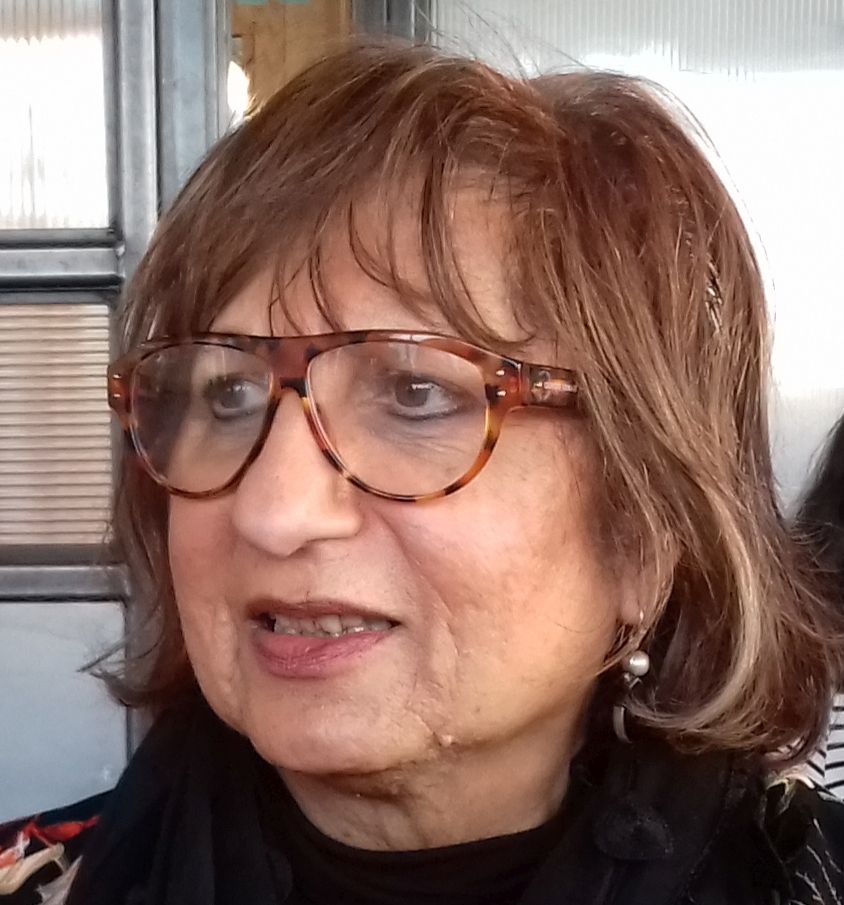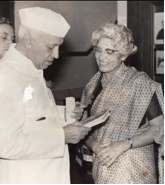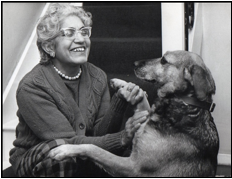Latest Contributions
My mother: Savitri Devi Chowdhary (1909 – 1996)
Category:
Tags:

Shakun Banfield nee Chowdhary was born and brought up in the U.K. She retains a keen interest in her parents' achievements in their adopted country England and has many memories of a happy family life with them and her brother.
She worked for 30 years in the criminal justice system as a probation officer as well as in the family courts as a welfare officer and mediator. She is now retired and lives with her husband in South London.
Ed. note. Her father's story is available here.

Savitri, Multan, 1928
Many Laindon (a town in England) people will remember my mother Savitri Chowdhary as the wife of my father, their well-loved General Practitioner, or G. P., as doctors as known in England. She was indeed a most supportive loving spouse and mother and her determination to succeed in whatever task she set herself knew no bounds.
Her inspiration may have come from the character she was named after in Hindu mythology as Princess Savitri's steadfast loyalty to her husband so impressed Yama, the God of Death that he granted her wish and released her husband from Death allowing him to return to life to resume his role as her husband.
My mother was born in Multan, now in Pakistan. She had four sisters and a brother. She was particularly devoted to her father, a school teacher, following him into that profession teaching in a girls school before marrying my father in 1928. She moved to live with his family in Muradpur a small village in Punjab India.
Soon after their wedding, my father came to England to study for postgraduate medical qualifications. He decided to stay, taking up a post of G.P. in Laindon. After a four-year separation, my mother joined him in 1932.
After the long sea voyage, she finally reached Victoria Station in London, fully expecting her husband to be there to meet her. She was disappointed not to see him and after waiting in vain took refuge in the home of a fellow passenger. When he eventually arrived there, his reason for the delay was that he had been held up with a patient, gently explaining that they had to get back to Laindon straight away in time for evening surgery. Such was his devotion to duty!
Their first home was at York Villa, in the High Road where facilities were Spartan, with no electricity and outdoor bucket W.C. There was a resident maid but it was understood that once my mother found her feet the maid would be leaving - in fact my father had found her work elsewhere. When Dr. Gilder, the Senior Partner retired, my father purchased the practice, and my parents moved to Daisybank where the surgery was conveniently situated at the side of the house.
Whilst she struggled at times to grasp her totally new way of life as a doctor's wife in a small English town, her determination to adapt and prove her worth shone through. Part of this adaptation was to give up being a strict vegetarian and to start eating fish, eggs and meat. She also had her waist length hair bobbed and started to wear western clothes, saving her silk saris for evenings out and formal functions.

Savitri, Laindon, 1937
She learnt to cook in an English way, keeping curries for evening meals only. Although she spoke reasonably good English, my mother took lessons to increase her vocabulary and knowledge of colloquial language with Miss Helen Perry, a retired schoolteacher who lived with her sister at a house called St. Benets in Noak Hill Road.
My mother's religious upbringing gave her a strong belief in God. This underpinned her efforts to adapt herself to the new environment, giving her strength of purpose and an optimistic outlook. In the event, she succeeded in providing a supportive situation at home and soon established herself with local people as a helpful, kind person with a strong interest in other people's lives and experiences. My brother in his tribute to her described her "like a ray of sunshine as she darted about helping people and working hard to keep the practice going". By the time my brother was born in 1935, my parents could afford help in the home, and my father took on an assistant as well.
Before the outbreak of the Second World War, my mother was lured into the campaign for Indian independence and became a member of the India league. The guiding light of this organisation was Krishna Menon, a one-time St Pancreas Borough Councillor, co-founder of Penguin books. She attended meetings in London and was sometimes asked to speak in public. This experience stood her in good stead in later years when she lectured to various societies on Indian festivals and culture.
Following a difficult pregnancy when she fell over during the seventh month fracturing her pelvis, my mother gave birth to me in 1938. By then she was quite used to taking second place to my father's heavy workload. She did not even minding that he did not come to visit her in Southend General Hospital each evening after the birth, like other fathers.

Chowdhary family, Laindon. 1938
During the war years, my mother spent most of her time in the heart of the local community, in particular, supporting those whose relatives had been killed, wounded or reported missing. At some stage, when the authorities ordered evacuation of the Southend area, many Laindon people, especially mothers with young children, decided to go away to safer places for a while.
She took my brother and me to St Austell in Cornwall where we stayed with the Kelynack family who had earlier had a chemist's shop in Laindon High Road. We returned to Laindon after a few months when air raids were beginning to take place in Cornwall as well and spent the rest of the war at Daisybank with my father.
When Mount Everest was being scaled for the first time in the early 1950s, a letter in the Times newspaper drew her attention to the fact that Raymond Lambert, a mountaineer with Sherpa Tensing, who reached the then highest point of the mountain, always ate a large bowl of semolina pudding whilst on expeditions and considered that because of this, nothing ever went wrong.
This prompted my mother, who had by now qualified as a journalist, to respond, pointing out that Indian people also enjoyed semolina preparations, in particular Halva. She gave the outline for the recipe.
Her letter went on to say, "This dish is one of the oldest and most popular sweet dishes of India. Elderly ladies firmly believe that this is the best food for giving strength and energy. It is also the favourite sweet dish of the Punjabi Sikhs, who are universally known for their fighting ability, strength and tenacity".
In response my mother received letters from all over the world asking for the full recipe for Halva as well as expressing interest in other Indian dishes. This prompted her to embark on writing a recipe book, which as Indian Cooking published by Andre Deutsch in 1954, held the field as the only one of its kind for many years, until the admirable Madhur Jaffrey and others picked up the torch.

Cover of Savitri's cookbook. First published 1954
Research for the book included visits to India to refresh her existing knowledge as well as to discover new dishes. Although the recipes in Indian Cooking favour the cooking used in Punjab, they are essentially classic in their method and easy to follow with the ingredients readily available.
She can be seen in the photograph presenting a copy of the book to Prime Minister Nehru on one of her many trips to India.

Savitri presenting her cookbook to Prime Minister Nehru. Delhi. 1957.
The book was re-published after she died as part of a cookery classic series in 1999. She would have been delighted to know of the renewed interest in her book and that her recipes continue to contribute to the richness of the different cuisines that we now enjoy.
Despite my mother's many other activities, she never lost the traditional Indian value that sees food preparation as an expression of love and nurturing of the family. In enjoying the delicious recipes, you not only continue to be nourished by her, but are also enriched by an essential quality that was an integral part of her.
As I said in the article about my father, the high point of his day, after a hard time tending to his patients, was the Indian meal prepared by my mother which he loved. He enjoyed spicy food and as children, my brother and I would watch the perspiration appear on his forehead and trickle down his face as he ate with relish, frequently augmenting his main meal with homemade hot pickle and raw chillies.
As children my mother made mild curries for us. Even our dog enjoyed left-over curry and was particularly fond of chapattis! Whenever I was feeling below-par, my mother would cook something tasty usually pakorhas as they gave warm savoury comfort and had a magical effect, raising the spirits of the most unhappy child. If you had a sweet tooth, then carrot halva would have a similarly uplifting effect.
As well as Savitri Chowdhary being the author of Indian Cooking, using material from her detailed daily diary entries, she wrote a memoir called "I made my Home in England". This describes in some detail her experiences as a young Indian woman adapting to a totally new way of life as the wife of a dedicated doctor in the small community of Laindon. She also wrote a short piece about my father's death - "In Memory of my Beloved Husband".
Prior to my father's sudden death in 1959, Basildon Development Corporation had revealed plans to demolish most of Laindon High Road - this of course included Daisybank. I recall how my father attended meetings and expressed strong opposition to the plans. He told us that he would never leave our home and would remain there even when the bulldozers came.
In the event, he died before the house and surgery were demolished, so my mother, my brother and myself had not only to suffer this most devastating loss, but also the subsequent loss of our family home a couple of years later. In those days there was no law requiring Basildon Development Corporation to pay market value for property and land obtained by compulsory purchase order. So the payment made to my mother in no way reflected the true value of the four bedroom house and large amount of land at the back. Not wanting to move out of the area, my mother and brother moved to a smaller house in Clayhill Road, Basildon (by then I was living away ).
My mother had a rare capacity to accept people without question. I never heard her make a critical or negative observation about anybody. Being a gregarious person, she made many new friends of all ages in Basildon and soon became a familiar figure walking her dog in the area.

Savitri with her dog Lassie. 1965
She was able to keep in contact with her many Laindon friends as well, remaining a governor at Laindon High Road School, retaining a close link with Chowdhary School and continuing her work for the elderly. She carried on regularly writing interesting letters to both the National and local press, copies of many of these are still in my possession and will be the subject of another article. They were usually upbeat reflecting her optimistic view of life. Writing was always an important part of her life and as well as her daily detailed diaries, she wrote several articles and started a novel.
Her diary was full of bookings from organizations requesting a talk on various aspects of Indian culture to which she invariably took large samples of curry she had prepared earlier for the audience to taste. A great believer in bridging the gap between her country of origin and her adopted country, she always felt she belonged to two countries and could be loyal to both especially as they were friendly countries. She continued to attend meetings and social functions organized by the Indian community in London and visited her many relatives in India from time to time.
Always in touch with the spiritual dimension, as well as retaining a link with my father after his death by meditating in front of a photograph of him, my mother also began meditating whilst watching the sun (through dark glasses). This became a daily occurrence whenever the sun was out of course and, to quote my brother again "she missed it when it went in, yet never despairing of its reappearance." She seemed to gain emotional strength and wellbeing from this habit.
In 1983, over twenty years after my father's death, she decided to sell her house. She moved to live in Chelsea with my brother and his wife who had prepared a flatlet for her on the ground floor of their house.
The move involved severe downsizing. My brother and I, who were overseeing the move in Basildon, never understood how all her remaining possessions were fitted into the small area by my sister-in-law and my husband at the other end. Although she missed all her Laindon friends, my mother found it comforting to be in a loving environment after living on her own. She valued all the care given to her by my brother and sister-in-law with visits to my husband and myself at Bromley on Sundays.
Shortly after the move, the ailments she suffered from made it harder and harder for her to walk unaided. After a period of adjustment to her new home, she became a well-known figure in a wheelchair, being acknowledged by local residents as well as Chelsea Pensioners in the Kings Road.

Savitri outside her Chelsea home. 1994.
In a letter of condolence a friend wrote of my mother "Most people wear a wheelchair as an encumbrance and a disability, but she sat in it like a queen!"
Despite her ill health, she managed to enjoy life and remained optimistic and jovial, giving pleasure to those around her. One of her great loves was music and she had a good singing voice - I have a strong recollection of singing Indian songs and hymns as well as English pop songs with her whenever we met. One of her great favourites from the old days was "You are my sunshine".
Savitri Devi Chowdhary died in the Chelsea and Westminster Hospital in January 1996 aged 87 years from a bout of pneumonia. In a letter of condolence the late Mavis Folkard (nee Gray) wrote "She had a great capacity for making friends and always remembered people. We had a lot of laughs whenever we met ... I shall always remember her with affection as will many local people".
My mother remained a Hindu till she died. Both Hindu and Christian priests contributed to her funeral service reflecting the high regard in which she held these religions. My brother in his tribute to her quoted aptly from Shakespeare emphasizing her acceptance and kindness towards everyone she came into contact with "a largesse universal like the sun her liberal gaze did give to everyone". He went on to say "The emphasis on the sun if not accidental as the sun held a special place in her affections".
Although she is greatly missed, my mother's radiance still shines brightly for those of us who remember her.
____________________________________________________
© Shakun Banfield 2018
Editor's note: I approve all comments written by people\; the comments must be related to the story. The purpose of the approval process is to prevent unwanted comments, inserted by software robots, which have nothing to do with the story. If the captcha puzzle below is too hard, please send you comment to indiaofthepast@gmail.com\; the editor will post it for you.
Comments
Add new comment